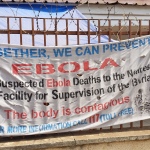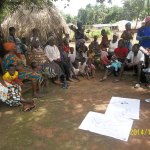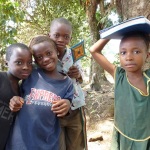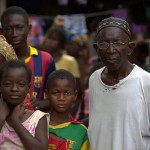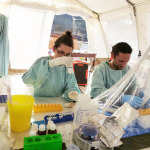The Sierra Leonean diaspora was active in responding to the Ebola outbreak that hit Sierra Leone in March 2014, both by providing financial and material support, and through direct communication with relatives, friends and colleagues back home. This paper looks at the role of diaspora communications on health seeking behaviour in Sierra Leone. It examines the range of communication strategies employed by members of the diaspora; the dynamics of communications as the epidemic spread during 2014/15, and the role of diaspora associations in liaising with
Continue reading →
The Community Led Ebola Action (CLEA) has empowered communities to do their own analysis and take their own action to become Ebola-free in Sierra Leone. CLEA has focused on triggering collective action by inspiring communities to understand the urgency and the steps they take to protect themselves from Ebola. Community Mobilisers have facilitated this process and communities have modified norms, beliefs and behaviours in response to the conditions around them. The CLEA Approach was used to trigger 9,285 communities in Sierra Leone as of April
Continue reading →
This briefing explores how rumours about Ebola in Sierra Leone influences people’s perception and response to Ebola, from the political, historical and social perspectives. Despite the efforts of the World Health Organisation to control the Ebola outbreak, achieving zero cases and providing support for survivors, rumours about the cause of Ebola and the response to it continue to circulate. These rumours, a product of the initially over stretched and poorly implemented Ebola response, were more often linked to long-term issues of structural violence that also contributed to the unprecedented
Continue reading →
Nearly half the population of Sierra Leone is under the age of 18 years and the impact of the Ebola crisis on their lives now and on their future opportunities has been far-reaching: no school; loss of family members and friends to the virus; and changing roles and responsibilities in the home and the community. While the priority now remains meeting the goal of zero cases, the Government of Sierra Leone (GoSL) is also developing a comprehensive strategy aimed at supporting communities to recover from
Continue reading →
There have been numerous recent analyses of the different manifestations of ‘resistance’ and ‘reticence’ that continue to be critical in Guinea. The socio-historical context that has contributed to deep-rooted mistrust of the State and authority (a sense of ‘abandonment’ [the West has only returned to intervene in Guinea to ‘count cases’ and international actors will again abandon the country when cases are ‘acceptably low’]; heavy-handed or repressive interventions; the perception that elites treat people as if they are disposable and unworthy etc.) is well recognised.
Continue reading →
It took the threat of a global health crisis to illustrate the failings of Africa’s health systems. Resilient health systems, free at the point of use, are evidently a global public good. They are essential for the provision of universal health coverage and for a prompt response to outbreaks of disease. Resilient health systems require long-term investment in the six key elements that are required for a resilient system: an adequate numbers of trained health workers; available medicines; robust health information systems, including surveillance; appropriate
Continue reading →
A component of the Ebola epidemic control policy in Sierra Leone is triage and isolation in decentralised Community Care Centres (CCCs) or Holding Units, from where transfer to Ebola treatment units (ETUs) is arranged for those diagnosed as positive. The epidemic is currently waning, there are sufficient beds in the ETU, yet new micro-epidemics emerge, raising questions about the future role and relevance of the CCC. This briefing summarizes the preliminary findings of a formative evaluation conducted by the UK based Ebola Response Anthropology Platform
Continue reading →
This advisory brief aims to provide anthropologically informed guidance to governmental and humanitarian actors involved in the Ebola response at local, national and international levels, about clinical trials for Ebola treatments, therapies and vaccines. It serves to (1) clarify and demystify some of the scientific and technical discussions around the numerous clinical trials; (2) revisit issues surrounding the compassionate use of experimental medications and therapies in and after an emergency; and (3) provide a summary of the cultural, institutional and historical factors that impact the
Continue reading →
The Working Group on Clinial Trials coordinated by the Ebola Response Anthropology Platform has produced a working document which considers the clinical trials that are planned as part of the Ebola outbreak response from a sociological and anthropological perspective. The document develops a series of critical and empirical questions to guide research that should be conducted within, alongside or separate from clinical interventions. The document goes on to consider questions specific to vaccine, therapeutic and convalescent blood and plasma trials.
